Today we are pleased to present a guest contribution by Jamel Saadaoui (University of Strasbourg).
Commerce is a cure for the most destructive prejudices…wherever we find agreeable manners, there commerce flourishes; and that wherever there is commerce, there we meet with agreeable manners.
When two nations come into contact with one another, they either fight or trade. If they fight, both lose; if they trade, both gain.
Peace is the natural effect of trade. Two nations who traffic with each other become reciprocally dependent…their union is founded on their mutual necessities.
Montesquieu, The Spirit of Laws, 1748
In these couple of quotes, we can easily understand that the French Philosopher Montesquieu (Charles Louis de Secondat, of his real name, born in 1689 and died in 1755) had a positive view on the effect of commerce and trade on the political relationships between two nations. Maybe it was true at his time. Related to this question, Menzie Chinn recently wrote here on the trade relationships of Germany before World War I. Maybe, increasing trade is not always a good predictor of peaceful relationships. Montesquieu may be wrong.
An interesting question would be to test the case of China, its emergence has not been fully understood at the beginning of the 1990s (see here), expect the business community which was well aware of the huge consequences of China’s takeoff. After the entrance of China into the WTO on December 2001, the place of China in world trade has become increasingly important. This trend was continued until the Global Financial Crisis (GFC). Did this expansion of trade for China cause more peaceful relationships with its trade partners during the last 60 years?
Antonio Afonso, Valérie Mignon, and I investigate this question in a recent working paper. In order to answer this question with some empirical evidence and not rely only on intuitions, we need three ingredients, namely, (1) variables that measure trade linkages, (2) variables that measures bilateral political tensions, and (3) statistical tests that allow for time-varying causality. For the trade linkages, we use the current account balance (to include the income balance) and the bilateral exchange rate with the US dollar (the dollar remains dominant in trade; see here). For the bilateral political tensions, we use the Political Relationship Index (PRI) built and mainting by Xuetong Yan and its team at Tsinghua University (see here). For time-varying non-causality tests, we rely on the test developed by Shi et al. (2020). We will focus on important trade partners of China, namely, the US, the UK, and Germany. We also look at three important tarde partners, India, Japan, and South Korea.
At this point, one may wonder about the quality of the PRI to measure bilateral political tensions. In the following Figures 1 to 3, you will see that the fluctuations around the main events are regularly reproduced.
Figure 1: Bilateral Political Relationship Indices (PRI): Highlighting US-China events
Figure 2: Bilateral Political Relationship Indices (PRI): Highlighting Europe-China Events
Figure 3: Bilateral Political Relationship Indices (PRI): Highlighting Asia-China Events
If you are sufficiently convinced that these indexes are reliable, we can turn now to the time-varying noncausality test between trade linkages and political tension to answer our question. In the paper, we use an alternative measure of political, namely, the ideal point distance to China in the UN General Assembly votes (see here), as a robustness check. For the bilateral exchange rates, we also add in the lag-augmented VAR, the GPR index of Caladara and Iacoviello, and the VIX, as these two variables may influence the bilateral exchange rate.
The case of Germany is particularly interesting. As shown in Figure 4, a one-way causality runs from the PRI to the exchange rate and the current account for most of the considered period. Globally, the continuously improving political relationships between China and Germany are accompanied by a depreciation of the CNY and growing current account surpluses, except at the end of the period where the tense relations that are beginning to emerge go hand in hand with the appreciation of the Chinese currency. After the entrance of China into the WTO, the relationship between China and Germany was at the heart of the global value chains. This particular link was reinforced during the enlargement in 2004 to eastern Europe, as Germany began to become the industrial core of this new EU with a center of gravity that shifted to the East. Germany and China have become two major players in terms of trade flows (Miranda-Agrippino et al., 2020).
Overall, our findings show that Montesquieu’s “doux commerce” view is not always valid for the US and UK and never for Germany. According to him, causality should run from trade to political relations since trade partnerships should produce more peaceful relationships between individuals and nations. We find that both the “doux commerce” and the “trade follows the flag” views are supported by empirical evidence over different times for the US and the UK, illustrating the relevance of a time-varying specification. The most striking result is that “trade always follows the flag” for Germany and China: we reject the null hypothesis of non-causality running from political relations to macroeconomic variables, while the null of non-causality from political relations to macroeconomic variables is not rejected. This illustrates that good political relationships were a prerequisite to the expansion of trade between China and Germany.
Figure 4: Time-varying causality for China and Germany
In the case of Asian partners, although there is no causality from the PRI to the exchange rate most of the time, it is significant in specific periods where particular events were at play. Sino-Japanese relations have globally followed an increasing trend until the beginning of the 2000s (Figure 5) and were significantly warmed after Shinzo Abe—and later Yasuo Fukuda – became the Prime Minister of Japan in September 2006. A strong dispute between the two countries has concerned the territoriality of the Senkaku/Diaoyu Islands, which has accentuated the tensions. This deterioration of Sino-Japanese relations has affected the yen exchange rate, as illustrated by the significant causality observed in Figure 5. Turning to Sino-Indian and Sino-Korean relations, they have improved throughout the period, explaining why causality from the PRI to exchange rates is most of the time nonsignificant. The significant causality observed during the mid-1990s for the Indian case can be explained by border issues and India’s nuclear tests, while it is notably the result of tensions linked to the severed diplomatic ties of Taipei and Seoul in 1983. Regarding the reverse causality, for the exchange rate to the PRI, it is especially significant in the 1990s for India, corresponding to a period of a sharp depreciation of the rupiah coming from current account deficits and a loss of investor confidence.
Figure 5: Time-varying causality for China and Japan
This post written by Jamel Saadaoui.
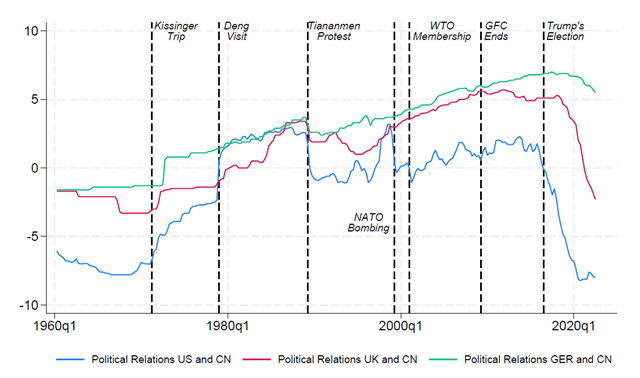
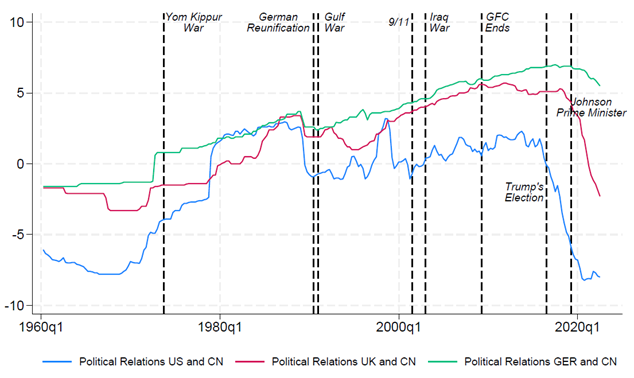
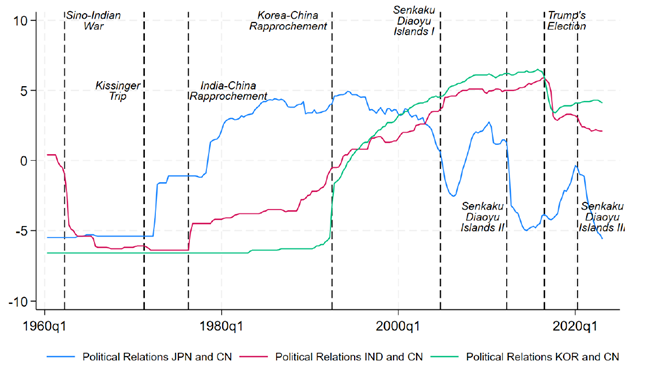
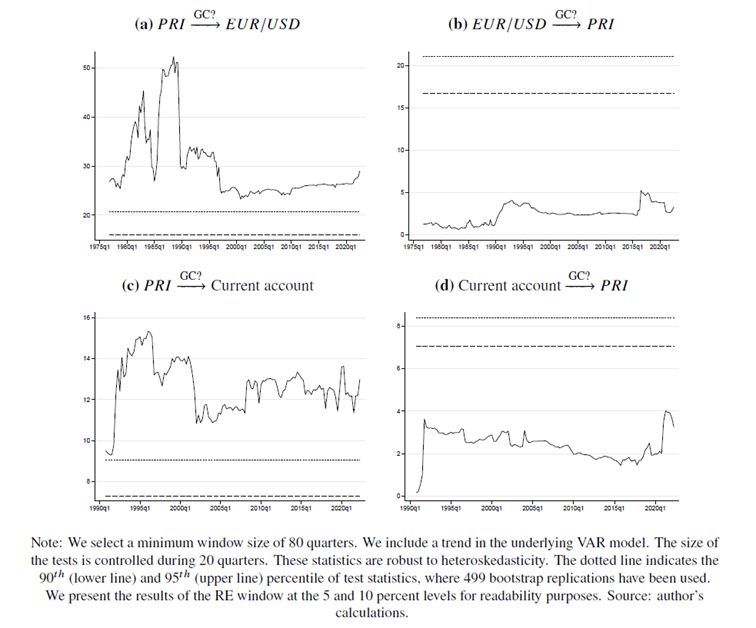
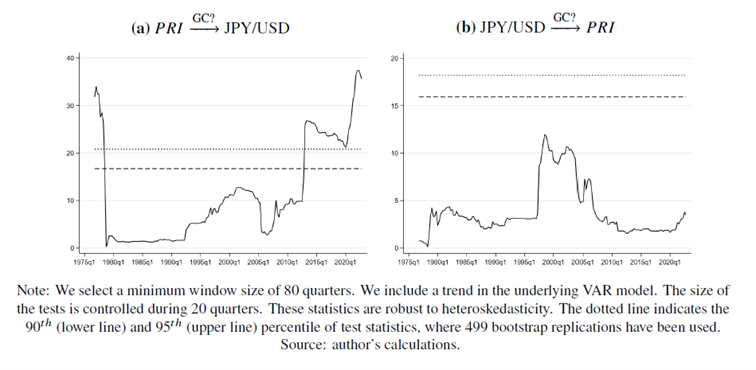
Well that was fast. Excellent exposition.
It was an interesting discussion. Too bad Princeton Stupid Steve did not get it (surprise, surprise, surprise).
Why is ‘Xi takes power’ not on the graph? The problems with China have nothing to do with China, and everything to do with Xi.
Do you see “Abe takes power” on the graph? Do you see China’s WTO accession? This is Saadaoui’s work, not yours. Insisting on you hobby-horse is a wee bit small-minded, don’t you think?
If you don’t think Xi matters, then you probably don’t think Trump matters either.
Did I say Xi doesn’t matter? Defensiveness hasn’t made you any smarter.
If you think he matters — and I think he is decisive in the analysis — don’t you think he should be mentioned on the graph?
Steven Kopits
April 15, 2024 at 12:08 pm
A lot of people “matter” in some respect but have no place in this excellent discussion which YOU apparently never comprehended.
BTW little Stevie boy – your idiotic opinion does not matter so do us all a favor – SHUT UP!
What a STUPID comment – even for you. Dude – your childish boorish behavior is not a sign of intelligence. Of course you are at the bottom of things -a very dumb person with an overinflated ego.
Dude – accept the fact that your rants have a 100% accuracy for being incredibly stupid.
Judging from Stevie pooh’s comments, he must think Hu Jintao and Jiang Zemin were big promoters of democracy. Yea – Stevie is THAT DUMB!
Once again, it comes down to property rights. Both Hu Jintao and Jiang Zemin allowed negative property rights to develop in China. That is, they allow the public there to act as though they had property rights, for example, the rights to the property on which their apartments were built. They allowed people to travel in and out largely unmolested, to send their children to US schools, to allow businesses and businessmen to operate without fear of arbitrary arrest or raids. If such a system is allowed to continue, it will develop, if nothing else, a system of common law, that is, rights not enshrined in an enforced constitution, but rather established through tradition and practice. Britain developed much this way. To this day, it lacks a formal constitution.
Xi is interested in positive property rights, that is, that no one can move without his permission.
Here’s how the Washington Post put it:
For the past decade, Americans have worried increasingly about China, not least because Chinese President Xi Jinping has centralized power, silenced critics, stalled private-sector reforms and taken an increasingly combative posture toward the rest of the world. China was set to overtake the United States as the world’s largest economic power by 2035, Mr. Xi predicted; China would then retake its rightful position at the center of world affairs.
Instead, Mr. Xi’s China is less free, less prosperous and less competently governed than it would have been had he taken a different course — one not inspired by rivalry with the West or fear of his own people.
In the face of these challenges, China’s leadership appears paralyzed. The country’s economic policymakers were once well-respected. But Mr. Xi’s centralized rule appears to have stymied decision-making.
https://www.washingtonpost.com/opinions/2024/02/21/china-economy-demographics-us-china-trade/
Xi’s accession is central to China’s story, and if he starts WWIII, central to the future of the world for centuries to come.
Property rights? That’s it? Hey MORON – ever heard of Lenin’s 5 year plan. Property rights! Now if you think Russia ever had a democracy, you are dumber than even I gave you credit for.
Russia?
And that’s why China needs democracy. Xi is trying to turn the clock back; economic development demands that the clock move forward toward democracy. This is the tension I have been writing about it for the better part of a decade.
Oh, come now. The fact that you started making a claim a decade ago, or a lifetime ago, doesn’t mean squat. China’s period of rapid growth came under authoritarian rule. How does “Stevie says” account for that fact?
Just as “trade prevents war” or “tax cuts stimulate investment” or “Republicans are better economic managers”, the notion the democracy is a stimulus to growth doesn’t necessarily sta d up to examination. There are obvious reasons that Xi’s rule has been bad for China, apart from his failure to institute democracy.
Ever noticed how those worthless posts over at Stevie’s blog never ever get a single comment. His traffic is even lower than the traffic over at Truth Social as his posts are even dumber than Trump’s tweets.
https://www.kyivpost.com/authors/715
Oh yes – another rag that runs your stupid trash. I guess you will remind us you have appeared on Fox and Friends too. MORON.
At a certain point, a society needs formally protected property rights independent of the whims of the ruler. That is usually a function of GDP / capita, and almost all countries with GDP / cap above, say, $13,000, are democracies in some form. China is becoming an ever greater exception, if we leave out the oil autocracies. In a democracy, property rights are vested in the public, perhaps imperfectly so, but nevertheless vested there. This puts concrete limits on the power of the ruler and limits antisocial behavior. Do I think the average Chinese citizen wants to start WWIII? I don’t. Do I think Xi might start WWIII? Absolutely.
So, yes, democracy matters, and at China’s current state of development, it matters a lot.
Property rights are fine. But there is a lot more to democracy than that. Look Stevie – we get you are a moron so relax.
In it’s fundaments, I don’t think there is.
Democracy is about who gets to decide, and by extension, where property rights lie.
“almost all countries with GDP / cap above, say, $13,000, are democracies in some form.”
This is a really stupid lie. Russia is not a democracy. Hungary is no longer a democracy. Both have income/person above your idiotic cutoff. Should I list all those Middle East nations with high incomes per capita who are not democracies.
Dude – you are not only stupid but a serial liar. Please stop polluting this blog with your insanity.
Well, last election, Hungary was still a democracy. That’s no great reflection on Hungarians, but it is still a democracy. Orban and FIDESZ won the vote, and no one has said the election was fixed.
Russia has always been a backward place, but it has characteristics of an oil autocracy.
Genocide in Gaza is a terrible look for the ‘democracies’ effecting it, no?.
‘Steven Kopits
April 15, 2024 at 12:10 pm
Well, last election, Hungary was still a democracy.’
Yea – you are a true MORON. Putin won his last election too. BFD.
Give me a source who says Hungary’s elections were fixed.
Genocide in Gaza?
The current population of the State of Palestine is 5,468,091 as of Monday, April 15, 2024, based on Worldometer elaboration of the latest United Nations data. The State of Palestine 2023 population is estimated at 5,371,230 people at mid year.
https://www.worldometers.info/world-population/state-of-palestine-population/
If that’s genocide, bring me a coffee. I can assure you, if the Israelis set out to kill the Palestinians, they could do it.
As for genocidal policies, that’s exactly what river-to-the-sea is, isn’t it? Doesn’t it call for the eradication of all Jews from Israel? Isn’t it exactly the same thing as Hitler’s Final Solution? Sure seems that way.
Steven Kopits
April 15, 2024 at 3:38 pm
Princeton Steve showed how little he gave a damn about the plight of those BROWN citizens in Puerto Rico after Maria by downplaying over and over again their suffering.
Now racist Princeton Steve has declared that those Muslims in Palestine are not really dying.
Hey Stevie – how does it feel to be more racist than even Stephen Miller?
There’s this expression those that ignore history are doomed to repeat it. Like the history of me once and a while wasting my time reading your stupid blog. I do so and vow to never do it again. But then I venture back and bore myself with reading yet another incredibly dumb rant. And of course you waste our time with dumb comments like the ones you have made here. PLEASE STOP.
“Xi is trying to turn the clock back; economic development demands that the clock move forward toward democracy. This is the tension I have been writing about it for the better part of a decade.”
Xi became leader 12 years ago. Over that period, real GDP in China has double. To say Xi is turning back the clock on economic development is a joke. Then again everything you say is a joke.
Speaking of China, Setser has a new piece entitled “China’s New Currency Peg”:
https://www.cfr.org/blog/chinas-new-currency-peg
This is a well supported, out-loud statement of what has been obvious since early his year; the yuan is more “flexible peg” than “managed float” this year, no matter what Chinese officials may say. From May 2022 through November 2023 was a raggedy period for the yuan. Outflows were becoming a problem, and that kind of problem is self-fulfilling if ya don’t stop it. So China stopped it.
Thanks for this as I enjoy reading the informed economics of Brad Setser (as opposed to the serial BS from you guessed it – Princeton Stupid Steve).
Oft topic, but I just can’t stop thinking about this mess. The following history involves some overlapping chronology:
The Shah was a brutal idiot who turned the majority of Iran’s citizens against him. The U.S. supported the Shah. Support for a brutal idiot meant the U.S. lost favor in a country with a large population, large oil and natural gas resources and a strategic location in the Middle East.
Ed Meese asked Iran to delay releasing U.S. hostages until after the Carter/Reagan presidential election, and then the Reagan administration used Iran as a channel for illegal arms shipments to Central America.
Hezbollah, in its infancy, drove the U.S. out of Lebanon by killing a lot of diplomats, spooks and troops with suicide bombs. Hezbollah is an Iranian creation and ally.
A big part of the mindset for Iran and al Qaida has been that the U.S. will withdraw, as it did in Lebanon, if you inflict losses. Osama bin Laden emulated Hezbollah in developing methods of assymetrical warfare, including the 9/11 attacks. Iran supplied sophisticated roadside bombs and bomb-making technology in Iraq with the intention of inflicting losses on U.S. forces. From Iran’s point of view, that program is very likely to be seen as a success.
Iran and the U.S. were working toward cooperation on minor issues, with both sides aiming at de-escalation, when Bush, Jr. gave his “axis of evil” speach, setting off a race for nuclear weapons in Iran and North Korea. Moderate politicians within Iran lost access to power, while the Revolutionary Guard was put in charge of nuclear R&D.
Upon the U.S. invasion of Iraq on trumped up charges of Iraq having weapons of mass destruction, Iran offered a “grand bargain”, including UN nuclear weapons inspection and withdrawal of support for Hezbollah and Hamas. The Bush administration ignored Iran’s offer, even though Iranian leadership was by all accounts eager to strike the bargain. Iran proceeded with its nuclear program and continued support for Hezbollah and Hamas.
Bush overthrew the government of Iraq, the most important counterbalance to Iranian power, allowing Iran to extend influence over Iraq’s large Shi’ite population, and consequently over much of Iraq’s government. The second Iraq War was a huge boon to Iran. Instead of spending resources contending with Iraq, Iran now exercises considerable control over Iraq.
Obama worked out a deal with Iran, limiting plutonium enrichment to 4% in return for reduced economic sanctions. Netanyahu whined to U.S. polticians, with the support of U.S. neocons, in an effort to undo the oil-for-nukes deal.
The neocon/Netanyahu axis managed to make ending the oil-for-nukes deal a salient, mostly partisan political issue in the U.S. When Trump took office, he unilaterally withdrew from the oil-for-nukes deal, leading to a rebirth of Iran’s nuclear weapons program. The end of the oil-for-nukes deal also eliminated an incentive for Iran to tread lightly in dealing with U.S. interests and personnel in the region. In response to Iran’s increased aggression, Trump ordered the assassination of Qasem Soliemani, a hero among Iranian religious, military and political elites, while Soliemani was on Iraqi soveriegn soil. Iraqis were outraged.
The U.S. claims to support democracy, human rights, the rule of law and international law, but consistently fails in all of these claims when it come to Palestinians, Yemenis, and Iraqis. By Iranian lights, the U.S. also fails when it comes to Iranians – recall the Shah.
Iran has spread its support across large areas of the Middle East, with considerable influence in Syria, Iraq, Yemen, Gaza and Lebanon. In each case, Iran sees itself as having succeeded in its intermediate goals. The U.S. position is that Iran should stop its activities in each of these places.
Now, try to think of these events from Iran’s point of view (several points of view, actually). Is the U.S a trustworthy negotiating partner? Does the U.S. keep its word? Is U.S. policy-making rational? Can the U.S. hope to win public support against Iran in any of the places where Iran is operating successfully? Do U.S. demands offer anything of value to Iran’s ruling elites? My answer in each case is “no”. You may disagree, not that my answer or yours matters. The answer that matters is that of Iranian leaders.
Anyhow, let’s move on.
Biden told Bibi the U.S. won’t support Israel in attacking Iran; Iran’s attack was pretty obviously designed to make that an easy call for Biden. Without U.S. support, Bibi’s upside here is to avoid trading blows with Iran, because that would leave Israel open to a three-front war. Offering to support an Israeli attack on Iran could very well embolden Netanyahu to engage in a three-front war, leading to an escalation in a conflict with no obvious gain for the U.S.
The history of U.S. engagement with Iran pretty clearly shows that we don’t know how to turn little wins into big wins, and we hardly ever get even little wins. We mostly just shoot ourselves in the foot when it comes to Iran, a good reason to stop shooting. That is what Biden has decided, for now, and for now, Iran seems intent on not changing his mind.
United Arab Emirates, Saudi Arabia, Oman, Hungary, and Russia. A partial list of nations where income per capita is greater than $13,000 – which according to Princeton Stupid Steve means their governments are democracies. Yea – Stevie does manage to say the dumbest things ever. But he writes a worthless blog and gets to appear on Fox and Friends so he must be right.
Four oil autocracies and a country that is still a democracy.
You say Hungary is a democracy but I bet the average citizen neither agrees nor appreciates how you are so willing to sell them out.
Apparently Blue States resident Kopits’ thoughts mirror the Beijing leaders he so strongly despises (for the right reasons or for the wrong reasons??) in that the suffering of Kopits’ own ethnicity doesn’t budge his sympathy meter a single millimeter.
This is how Princeton Steve attempts to deny that no Palestinian has died as a result of Israeli’s invasion?
‘The current population of the State of Palestine is 5,468,091 as of Monday, April 15, 2024, based on Worldometer elaboration of the latest United Nations data. The State of Palestine 2023 population is estimated at 5,371,230 people at mid year.’
One can say this is breath takingly stupid as it is. But Stevie did this racist garbage after Maria rocked Puerto Rico and Trump handcuffed the FEMA response. Pattern? You betcha – after all Stevie enjoys sitting on the sofa of Fox and Friends.
https://population.un.org/wpp/
The 2022 Revision of World Population Prospects is the twenty-seventh edition of official United Nations population estimates and projections that have been prepared by the Population Division of the Department of Economic and Social Affairs of the United Nations Secretariat. It presents population estimates from 1950 to the present for 237 countries or areas, underpinned by analyses of historical demographic trends. This latest assessment considers the results of 1,758 national population censuses conducted between 1950 and 2022, as well as information from vital registration systems and from 2,890 nationally representative sample surveys The 2022 revision also presents population projections to the year 2100 that reflect a range of plausible outcomes at the global, regional and national levels.
So Princeton Steve relies on a 2022 UN estimate of the population of Palestine augmented by what essentially a clock that just assumes population continues to grow at a fixed rate as his estimate of how the Palestine population has changed over the past several months since Israel invaded Palestine. This “methodology” totally ignores the slaughter of Palestinians by the IDF or the famine Bibi’s decision not to let aid in.
Huh by Stevie’s approach no one died during COVID-19. By Stevie’s approach the number of people who died in NYC on 9/11/2001 was zero.
Yea Stevie’s approach is beyond stupid. It is heartless and borderline racist. But what’s new?
I think the accusations of genocide against the Israelis is thoroughly false. On the other hand, the accusation that Palestinians are aminated by the expulsion, if not extermination, of the Jews in Israel is true.
This, from Hamas’s general principles:
“There is no alternative to a fully sovereign Palestinian State on the entire national Palestinian soil, with Jerusalem as its capital.”
https://www.middleeasteye.net/news/hamas-2017-document-full
Do you believe in river to the sea, that the Israelis should be expelled or exterminated from Palestine as Hamas defines it?
Give me an effing break. I am a supporter of the state of Israel but Bibi is a right wing enemy of the two state solution. Now I do not use the word genocide but how Bibi has told the IDF to basically let innocent Palestinians to starve to death is certainly an abomination. But of course racist people like you do not care – like you did not care about Puerto Ricans after Maria.
Look – it is clear you have no soul, no humanity, or an ounce of either morality or integrity. But dude – your abuse of that World Population time clock showed how much utter disdain you have for the intelligence of people who read your serial BS. It is no wonder NO ONE takes your worthless blog seriously.
BTW arse-hole – I have never defended Hamas. But you defend the starvation of innocent Palestinians. You are nothing more than a boorish effing racist. Full stop.
You have conflated “Palestinians” with “Hamas”. Even you can’t be that stupid, so you’re being dishonest.
I would remind you that punishing populations for the acts of a few members is a war crime. Even if the population isn’t white.
Stevie is campaigning to get back on Fox and Friends so he can continue to lie about these matters with his racist buddies.
Steven Kopits
Fully certified in hasbara.
If only Hamas would commit suicide Israel would not get to murder women and children.
I begin to understand pgl
I had to look up what hasbara means. You’ve captured Princeton Steve quite well.
I’m sorry. Who started this war? Who killed women and children? Oh, yes, it was Hamas.
If the Palestinians want to end the war, it’s really simple. Deliver the hostages and deliver Hamas leadership. That simple. I assume you are calling for that, right?
You are one sick racist. Yes Hamas is disgusting. But not as disgusting as racist Princeton Steve.
‘Who killed women and children?’ Does that include Palestinian women and children? Then the answer includes the IDF at the direction of Bibi.
Oh wait – racist Princeton Steve does not consider Palestinian women and children human beings. Got it!
“Calling for”? How often we hear people who have “called for” despicable acts, who have set impossible requirements (deliver the leadership of a heavily armed group) using “Have you called for X?” as a way to change the subject.
Stevie, you are advocating war crimes. It doesn’t matter whether pgl or I or anyone else has uttered the shibboleth. You are advocating war crimes.
Of course, Israel denying Palestinian children of clean drinking water over multiple years “does nothing” to antagonize people living in Gaza. Nothing al all.
Princeton Steve – who has many times praised Viktor Orban – has declared that Hungary is a democracy. It seems the European Parliament disagrees:
https://www.theguardian.com/world/2022/sep/15/hungary-is-no-longer-a-full-democracy-says-european-parliament
Hungary can no longer be considered a full democracy, the European parliament has said in a powerful symbolic vote against Viktor Orbán’s government. In a resolution backed by 81% of MEPs present to vote, the parliament stated that Hungary had become a “hybrid regime of electoral autocracy”, citing a breakdown in democracy, fundamental rights and the rule of law. The European parliament’s resolution, which points to “the risks of clientelism, favouritism and nepotism in high-level public administration”, however, will make any climbdown on the protection of EU funds more difficult. Gwendoline Delbos-Corfield, the French MEP who drafted the resolution, described the conclusions as clear and irrevocable. “Hungary is not a democracy. It was more urgent than ever for the parliament to take this stance, considering the alarming rate at which the rule of law is backsliding in Hungary.” She added that “the large majority of MEPs supporting this position in the European parliament is unprecedented”. Of the 534 MEPs present for the vote in Strasbourg, 433 voted in favour, 123 against and 28 abstained.
But wait – there is also this:
‘Responding to the vote, Hungary’s chief spokesman Zoltán Kovács said the European Parliament “would do better do focus on energy prices that have tripled and quadrupled due to the failed sanctions,” reprising his government’s critique of the EU’s restrictive measures against Russia.’
Ah oil prices went up so critics of Orban have to bow down as long as little Stevie’s property rights are intact!
Is this the same paper referenced in above post?? Anyone know??
https://static1.squarespace.com/static/5673346d69a91a5538ecb206/t/638b6fbdcace63556048adb2/1670082564691/FRBNY_MirandaAgrippino.pdf
Awfully thick reading for this rube, but still want to know if it’s the same paper mentioned above.
Yes, it is!
Thank you Sir. Looks like an outstanding paper but somewhat above my head, First thing I need to do is learn how to read the visuals. Looks like an ultra fancy Venn diagram.
You’re welcome. It is a network analysis, when the country is at the center of the picture it means that it is an essential country in terms of trade flows or in terms of financial flows. For example, China and Germany are much more important for trade linkages than for financial flows.